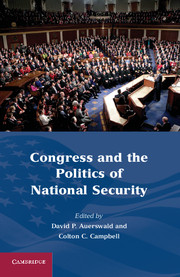Book contents
- Frontmatter
- Contents
- Figures and Tables
- Contributors
- Part One Historical and Institutional Challenges
- 1 Congress and National Security
- 2 Congress and U.S. Foreign Policy before 9/11
- 3 Institutional Challenges Confronting Congress after 9/11: Partisan Polarization and Effective Oversight
- Part Two Oversight Challenges
- Part Three Policy Challenges: Contours of Debate
- Works Cited
- Index
3 - Institutional Challenges Confronting Congress after 9/11: Partisan Polarization and Effective Oversight
from Part One - Historical and Institutional Challenges
Published online by Cambridge University Press: 05 June 2012
- Frontmatter
- Contents
- Figures and Tables
- Contributors
- Part One Historical and Institutional Challenges
- 1 Congress and National Security
- 2 Congress and U.S. Foreign Policy before 9/11
- 3 Institutional Challenges Confronting Congress after 9/11: Partisan Polarization and Effective Oversight
- Part Two Oversight Challenges
- Part Three Policy Challenges: Contours of Debate
- Works Cited
- Index
Summary
Numerous internal and external national security challenges confront Congress in the post-9/11 era. Externally, an interdependent world linked by the Internet means that issues or problems that arise in any part of the globe can impact this country, from pandemics to drug trafficking to cybersecurity. What happens in countries little known to most citizens during the pre-9/11 era, such as Afghanistan or Yemen, can affect the United States in consequential ways. Consider that this nation seems engaged in an endless global war (dubbed the “long war” by some analysts) against terrorists and their network of supporters, a marked departure from the pre-9/11 era of conflicts between and among nations. Today’s wars appear “limited in scope yet virtually unlimited in duration,” where Americans are not asked to sacrifice (except for those in the military and their families) but “to go on with their routines, not change them” (Hampson 2011, 2A). Addressing these challenges and developments can provoke sharp disagreement among our national lawmakers.
On March 10, 2010, for example, the House by a 356 to 65 vote overwhelmingly rejected a non-binding resolution (H. Con. Res. 248), offered by Representative Dennis Kucinich (D-OH), calling for the withdrawal of U.S. troops from Afghanistan within 30 days. Representative Kucinich’s basic point was that the cost of the ten-year (and counting) war in financial and other resources, in military casualties, and to nation-building at home is not worth the price. “Our supposed nation-building in Afghanistan has come at the destruction of our own,” he argued. The military surge announced by President Barack Obama in December 2009 “cements the path of the United States down the road of previous occupiers that earned Afghanistan its nickname as the ‘graveyard of empires’” (Congressional Record March 10, 2010, H1251). In response, then House Armed Services Chairman Ike Skeleton (D-MO) exclaimed: “Have we forgotten? Have we forgotten what happened to America on 9/11? Have we forgotten who did it? Have we forgotten those who protected and gave [al Qaeda] a safe haven?” (Ibid., H1255) (Skeleton was defeated for reelection in November 2010 when the GOP reclaimed control of the House.)
- Type
- Chapter
- Information
- Congress and the Politics of National Security , pp. 45 - 68Publisher: Cambridge University PressPrint publication year: 2011



